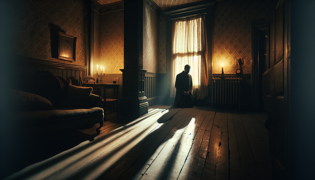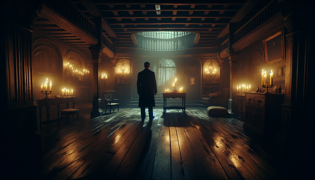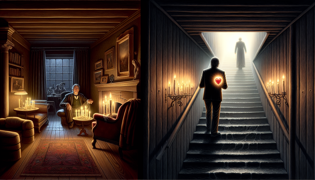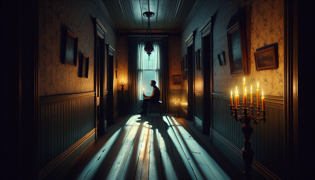Introduction
It began on a night as silent as a locked chest, when the ancient floorboards sighed beneath heavy boots and a single candle trembled in its holder. Joseph Harding was no stranger to worry—his mind was a knot of restless thoughts, twisting tighter with each passing minute. The house stood at the edge of the village like a watchful sentinel, its windows reflecting a pale moon that drifted behind clouds like a ship lost on a foggy sea. Inside, the air pulsed with an unseen rhythm. He’d told himself a dozen times that it was just his imagination, but each thump felt like a verdict rendered by some unseen jury. The wallpaper peeled in jagged lines as though the house itself exhaled a frustrated sigh. Joseph could almost taste the tension; it clung to his tongue like bitter tea in a cracked porcelain cup. He paced the narrow hallway, each footfall echoing like distant drums. A moth fluttered against the glass, its wings a fleeting ghost of movement in the dim light. An old-timer in town would’ve said he was acting "as jumpy as a long-tailed cat in a room full of rocking chairs," but Joseph knew what he heard. That steady pound—the tell-tale heartbeat—was no trick of the wind. It throbbed with purpose, driving him toward a truth that refused to stay buried. And so, with every breath caught between fear and duty, he stepped deeper into the shadows of his own making, each heartbeat marking the passage of time until justice, or madness, would claim him as its own.
Whispers in the Dark
Joseph paused at the threshold of the drawing room, where dusk had settled like a velvet cloak over antique furniture. The fireplace lay cold, its embers asleep beneath a layer of ash that gleamed silver in the candlelight. Each ticking of the old mantle clock was a drumbeat in the cavern of his skull. He squared his shoulders against a wind that seemed to sigh through the cracks in the sills, carrying remnants of last winter’s frost. A framed portrait of his late uncle hung crooked on the wall—its eyes, painted with uncanny realism, watched him with a gaze so piercing it felt alive. As he approached, the rug underfoot revealed its age in faded threads, creaking like an old ship’s mast. Joseph bent and lifted the coverlet that lay half-furled on the chaise. Beneath it, a leather-bound journal lay waiting, its spine cracked like a dried riverbed. His fingers trembled as he flipped it open, the pages whispering secrets voiced by handwriting in a dense, hurried script. Each phrase was a stone dropped in a silent pond, rippling through his mind. The words spoke of guilt buried deep, of a promise undone, and of a pulse that refused to rest even after death claimed its owner. A chill climbed his spine, riding on the hush between heartbeats. The candle’s flame flickered low, casting dancing silhouettes on the walls that seemed to take shape—two figures locked in a silent struggle. Joseph swallowed; his tongue felt like coarse sandpaper. He recalled his neighbor’s warning: "Don’t let the walls catch wind of your sins." But the walls already knew. With a low groan, he closed the journal and stood, each breath weighing him down like shackles forged from regret. Then, from somewhere beyond the hearth, the tell-tale heartbeat began anew—soft at first, like raindrops in a distant storm, then thundering through his chest with undeniable clarity. His lantern flickered, casting one final wavering glow before succumbing to darkness. Joseph Harding stood alone amid shadows that whispered threats and promises in equal measure, and the heartbeat, relentless as a steam engine, urged him onward.

Echoes of a Beating Heart
He stumbled into the next chamber, where polished mahogany met cracked plaster in a silent duel. The furniture lay oddly arranged, as though someone—or something—had moved it by unseen hands. His lantern’s glow trembled like a boat on stormy water, revealing the ghostly outline of a carved chest against the far wall. Joseph’s heartbeat hammered in his ears, each thud a reminder that the house was breathing with him. He approached the chest, hands itching to open its lid; inside, he hoped to find the source of that relentless pulse. His knuckles whitened as he lifted the cover. Empty. Not even dust had gathered there—only the echo of something lost. He pressed his palm to the cold wood, and a shiver shot up his arm. The heartbeat answered, deeper now, as if grieving its separation from flesh and bone. Joseph blinked, steadying himself against a sudden dizziness that turned the room into a carousel of fleeting visions. Candle flames stretched into long tendrils, wrapping around his mind like ivy strangling a tree. "Well, I’ll be hornswoggled," he muttered—an old saying passed down by his grandmother—"by a heartbeat that’s gone astray." But the rhythm persisted, pulsing like the blacksmith’s hammer at dawn. A trapdoor beneath the chest caught his eye, its edges warped with age. With trembling resolve, he lifted it to reveal a narrow stairway descending into the earth. Each stone step was slick with moisture, glowing faintly under his lantern as if eager to guide or mislead him. He descended, every breath a fight against the damp air that tasted of moss and time. At the bottom lay a chamber of bare stone walls, damp as a forgotten tomb, illuminated by a single shaft of moonlight through a narrow window. And there, at the center, lay a heart beating with solemn insistence—dark red, slick with moisture, yet impossibly alive. Joseph staggered back, his lantern clattering to the ground. The heartbeat rose to a fevered crescendo, echoing off every wall, driving all reason from his mind. He covered his ears, but the sound wasn’t just in his head. It reverberated in the marrow of his bones. Shadows spiraled around the chamber like dancers at a macabre ball, and Joseph realized he faced more than a reminder of past sins. The heartbeat was a summons, a call to answer for the wrongs he’d buried. Fear and remorse clashed like titans, and in that moment, Joseph Harding knew the night would not end until justice found its rhythm in his own frantic heartbeat.

Judgment in the Midnight Silence
His knees buckled beneath him as the lantern’s light danced across the chamber walls. The heartbeat had become a living creature—a judge, jury, and executioner all swathed in crimson desire. Joseph’s breath came in ragged bursts, each inhalation a battle against the oppressive air that thickened with every thump. He pressed a hand to his chest, feeling the frantic drum of his own heart trying to outpace the command that pulsed in the room. High overhead, the arch of the ceiling curved like the hull of a beached whale, its ribs forming skeletal arches that seemed to lean in inquisitively. Joseph found himself whispering to the darkness: promises, pleas, confessions—words that had no right to see the light of day. A solitary tear traced a path down his cheek, cold enough to freeze the fear in his veins. Then the heartbeat shifted, slower now, a measured cadence like a judge’s gavel echoing in an empty courtroom. It demanded resolution. Joseph closed his eyes, and all at once saw every misstep and broken promise laid out before him like bones on an altar. His uncle’s trusting eyes in the portrait, the neighbor’s gentle warnings brushed aside, the vows he crushed underfoot like discarded leaves. He had tried to outrun the past, but it had found him in the dark, summoning him to reckon. When he opened his eyes, the heart lay still. Its final beat seemed to resonate in the silent air, stopping just short of his own chest. Joseph reached out, fingertips brushing its surface, and felt warmth—an ember of mercy glowing against the chill. He bowed his head, voice steady for the first time that night. "I see you now," he whispered, "and I accept what’s owed." A gust of wind roared through the chamber, stirring dust motes like fireflies adrift in a summer night. The trapdoor above creaked, admitting a shaft of dawn’s first light that sliced through the gloom like a promise renewed. Joseph climbed the stairs with measured steps, carrying the still-beating heart as proof that justice had found its home. When he emerged into the parlor, the candle burned bright, banishing shadows as easily as remorse when one speaks the truth. He placed the heart on the mantel and watched as it shrank away, dissolving into a soft glow before winking out. In the quiet that followed, he understood: guilt can haunt like a restless ghost, but atonement is the flame that finally lays it to rest.

Conclusion
Dawn spilled across the village rooftops like warm honey, and Joseph Harding stood at his window, watching light chase away the remnants of the night’s terror. The house, once heavy with unspoken guilt, now breathed with relief, its walls straightening as if releasing a long-held sigh. The leather-bound journal lay open on his desk, its pages blank after the final confession, ready to birth new truths rather than old regrets. In the distance, church bells tolled nine times, each peal a testament to a heart finally at peace. Joseph pressed a hand to his own chest, smiling as the steady, ordinary rhythm of life pulsed beneath his palm. He stepped outside, boots crunching on frost-kissed gravel, carrying with him the knowledge that while shadows may linger, they cannot stand against the light of honesty. The village awoke around him—shopkeepers unbolting doors, children racing along cobblestone lanes, neighbors greeting with polite nods and curious glances. And though the memory of midnight’s heartbeat would never fully fade, it became for Joseph not a curse but a reminder: that true justice often echoes within, calling each of us to face our own reflections in the dead of night. As the sun climbed, he tucked the journal into his satchel and walked toward a new morning, ready at last to let the tell-tale heart guide him toward hope rather than dread. The shadows lay behind him, vanquished by the simple power of a confession spoken and a promise kept—proof that even the darkest secrets bow before a brave and honest heart.
At the crossroads, he paused, turning back to glance at the house that had held him prisoner. A breeze lifted a stray lock of hair from his forehead, carrying with it the scent of pine and possibility. "That’s that," he murmured, an old Yankee phrase that tasted of finality. With steady steps, he set off down the worn path into daylight, the past now nothing more than echoes beneath his feet, and the true beat of his heart guiding him home forever more.
On Main Street, the townsfolk spoke in hushed tones of strange happenings at the Harding residence. Some called him crazy. Others said he was blessed. But Joseph knew the truth: sometimes the only way to silence a guilty conscience is to let it speak its final judgment aloud. And in that admission, he found the truest freedom a man could ever know—where every heartbeat becomes not an accusation but a song of redemption, echoing through the corridors of the soul until silence falls at last. "Life’s too short to let ghosts ride shotgun," a farmer called out from his fence, and Joseph tipped his hat in agreement. For on that clear morning, the tell-tale heart was laid to rest, and in its place beat the steady drum of a second chance—warm, honest, and free of any shadows that might hold it back again.


















